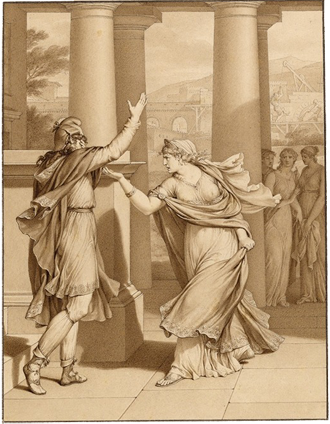Dido Queen of Carthage
Act IV Scene iv
Location: Dido's Court
Dido learns of Aeneas' planned escape and the Trojans are summoned from their ship. Aeneas wilts in the queen's presence, professing his love and determination to stay. But Dido does not fully trust him, and takes steps to ensure Aeneas cannot sail for Italy.
Dido:
It is Aeneas frowne that ends my daies:
If he forsake me not, I neuer dye,
For in his lookes I see eternitie,
And heele make me immortall with a kisse.
Dido, Queen of Carthage, IV.iv.120-3
Dido Summons Aeneas to Explain His Planned Departure
Word has reached Dido that the Trojans are preparing to set sail, and she fears Aeneas "will steale away with them" [IV.iv.3]. She quickly dispatches her sister to the water side to summon the Trojans back to explain themselves.
Aeneas Dissembles
Anna intercepts them just in the nick of time as "the sailes were hoysing vp" [IV.iv.15], and she brings them before Dido, confirming that Aeneas was indeed aboard. He now discredits himself further with a succession of shifty lies. First Aeneas claims he was only there "to take [his] farewell of Achates" [IV.iv.18] in direct contradiction to what Anna has just said and indeed the course of action he seemingly decided upon at the end of the last scene. An angered Dido demands the Trojans do set sail but without Aeneas, who desperately blurts out that the "sea is rough, the windes blow to shoare" [IV.iv.25]. Dido gives this short shrift: "when you were abourd twas calme enough!"[IV.iv.27].
Aeneas' last throw of the dice is to point out that the Queen still has his son Ascanius. Dido relents as she cannot believe that Aeneas would forsake his son in fleeing. We are left thinking yet worse of Aeneas for that is exactly what Marlowe has shown us he was going to do, even if such an act seems a little implausible.

Aeneas Again Vows to Stay in Carthage
Dido offers him the crown of Libya "to make amends", as indeed Aeneas predicted she would in the previous scene. After a brief doubt - "a sword and not a Scepter fits Aeneas" [IV.iv.43] - he is quickly overcome by Dido's flattery in which she ironically likens his crowned image to the very King of the Gods that he would defy by remaining in Carthage: "now lookes Aeneas like immortall Iove" [IV.iv.45]. Soon he is vowing to stay, ironically declaring "when I leaue thee, death be my punishment!" [IV.iv.56], and proclaiming Dido is "the harbour that Aeneas seekes" [IV.iv.59].
In a Marlovian addition to source, Dido instructs Anna to lead Aeneas to her horse so that he can ride through the city to show himself as her husband and her citizens' "soueraigne lord" [IV.iv.69]. The queen violently dismisses Anna's suggestion that some may not take kindly to this, suggesting her guards be commanded to slay any such offenders. She refers to her people as "vulgar pesants" who have her to thank for "all that they haue, their lands, their goods, their liues" [IV.iv.76]. There is no source for this very Marlovian tirade. Such sentiments might initially seem incongruent with the play's heroine, but we should remember how cruelly she has treated Iarbus since first being struck by Cupid's dart. Is this disdain for her people another side-effect of her passionate obsession?
Aeneas now determines to stay in Carthage, where "here in me shall flourish Priams race" [IV.iv.87], and from where he can lead revenge missions against the Greeks. The reaction of the other Trojans to this dramatic about-turn is not clear from the dialogue, with only Achates somewhat ambiguously commenting that Aeneas deserves "as large a kingdome as is Libia" [IV.iv.80]. However, the subsequent collective discussion of the plans for the city's rebuilding at the start of scene V.i imply a sudden about-turn, with the Trojans now happy to stay put.
Dido Doubts Aeneas' Promise
After everyone has headed off to organise Aeneas' pageant through the city streets, Dido is left alone with her thoughts. Initially ecstatic, she is soon thinking paranoid thoughts that he will attempt to leave her once again. Dido gives orders for her Nurse to take Ascanius to her house in the country. But she obviously has had doubts about Aeneas' sincerity on this point earlier, and further instructs her attendants to "bring me his oares, his tackling, and his sailes" [IV.iv.109] as guaranteed security that he cannot depart. He will undoubtedly be angered by her actions, but "better he frowne than I should dye for griefe" [IV.iv.111], even if "only Aeneas' frowne, is that which terrifies poore Didos heart" [IV.iv.116].
Once these tasks are reportedly done, and the ships' tackle, oars and sails brought to her, Dido launches into an increasingly maudlin soliloquy betraying her worst fears that, having done so once, Aeneas may well attempt to leave her again.